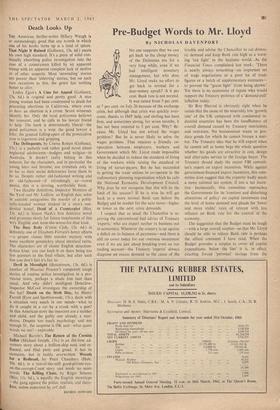Death Looks Up
THE American thriller-writer Hillary Waugh is so outstandingly good that any month in which one of his books turns up is a land of spices.
That Night It Rained (Gollancz, 13s. 6d.) meets his own high standard. It's a piece of solid con-
tinually absorbing police investigation into the case of a countryman killed by an apparent tramp with an apparent complete lack of motive or of other suspects. Most 'unwinding' stories are poorer than 'inferring' stories, but on such rare occasions as this, the genre has nothing better to offer.
Lesley Egan's A Case for Appeal (Gollancz, 13s. 6d.) is original and pretty good. A nice
young woman had been condemned to death for
procuring abortions in California. where even to have an abortion is a crime. Seven witnesses
identify her. Only the local policeman believes her innocent, and he calls in his lawyer friend to help. The book is determinedly liberal—the good policeman is a wop, the good lawyer a kike; the gradual falling-apart of the prosecution case is ingenious and gripping
The Delinquents, by Criena Rohan (Gollancz, 15s.), is a pathetic and rather good novel about
neglected adolescents—bodgies and widgies—in Australia, It doesn't really belong in this column, for the characters, and in particular the young hero and heroine, are criminals only in so far as their social deficiencies force them to be so, Despite rather old-fashioned writing and an old-fashioned—if refreshingly so—moral stance, this is a moving, worthwhile book.
Two likeable detectives, Inspector Montero of the Yard and Mr. Ludlow, an English don, solve in amiable antagonism the murder of a politi-
cally-minded woman student in a men's resi- dential hostel. Dead of a Counterplot (Bles,
13s. 6d.) is Simon Nash's first detective novel and promises nicely for future instalments of this very English and none-the-worse-for-that kind.
The Busy Body (Crime Club, 12s. 6d.) is definitely one of Elizabeth Ferrars's better efforts
—a proper classic little murder mystery with some excellent gimmickry about identical twins. The characters are of classic English detection- fiction kind; you can fault it on there being too few pointers to the final villain, but after such fun yo,u don't feel it's fair to.
Devil in Moonlight (Hutchinson, 13s. 6d.) is another of Maurice Proctor's competent tough
stories of routine police investigation in a pro- vincial town, perhaps a shade less taut than usual. And why didn't intelligent Detective- Inspector McCool investigate the ownership of
the hat? Death on the Sixth Day, by Henry Farrell (Eyre and Spottiswoode, 15s.), deals with
a situation very much in our minds—what to do if caught in a car by a crook with a gun? In this American story the innocent are a mother and child, and the guilty one already a mur- deress. Despite too much psychology and not enough lit., the suspense is OK and—what queer words we use I —enjoyable..
Michael Barrett's The Return of the Cornish Sailor (Michael Joseph, I5s.) is an old-time ad-
venture story about a bullion-ship sunk and re-
floated, and filial piety and greed. It has its moments, but is lushly overwritten. Wreath for a Redhead, by Peter Chambers (Hale,
10s, 6d.), is a run-of-the-mill good-private-eye- on-the-corrupt-Coast story and needs no more
words. The Killing Chase, by Roger Simons (Bles, 11s. 6d.), is equally the English stereotype —the gang against the police, realistic and there- fore, unless redeemed by art; dull.
ESTHER HOWARD


































 Previous page
Previous page